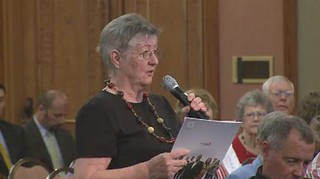Some of the “stuff” that happened before and after GA PSC Tim Echols cheered nuclear Friday.
GA Public Service Commissioner Tim Echols wrote in the Athens Banner-Herald Friday Echols: Nuclear power can be economic boon to Southeast,
Just when we thought nuclear power might be on a comeback, well, stuff happened. Only time will tell if Georgia and South Carolina can “jump-start” a nuclear renaissance. Let’s hope we can, because low-cost base-load energy — the amount of electricity available 24 hours a day — is a key to economic growth.
Stuff like this happened:
- June 2009: Moody’s called nuclear a “bet-the-farm” risk.
- January 2012: Leaks shut down San Onofre 3 and 4 in California.
- October 2012: Dominion Power decided to close Kewaunee in Wisconsin.
- November 2012: NRC denied a license for Calvert Cliffs 3 in Maryland.
- 5 January 2013: Duke closed Crystal River 3
- 20 February 2013: Plant Vogtle 3 and 4 $740 million over budget and 19 months late.
- March 2013: HB 267 fails (this time) to cap costs at Plant Vogtle. Yet it was introduced, which is a radical step for Georgia.
- 29 April 2013: Bloomberg links Kemper Coal cost overruns to Plant Vogtle cost overruns.
- 8 May 2013: Kewaunee ceases power production in Wisconsin.
- 22 May 2013: SO CEO Tom Fanning links Kemper Coal to Plant Vogtle.
-
24 May 2013:
Standard & Poor’s downgraded Southern Company because of Kemper Coal and notes:
If the company isn’t able to resolve the challenges at Mississippi Power or if similar issues arise at Georgia Power, the company’s rating could be downgraded.
- 7 June 2013: Southern California Edison permanently closed San Onofre 3 and 4.
- 3 July 2013: Southern Company downgraded by two analysts because of coal and nukes.
- 4 July 2013: Deadline extended third time for $8.33 billion federal loan guarantee for Vogtle 3 and 4.
- 11 July 2013: GA PSC required 525 more megawatts of solar power by Georgia Power, doubling the total. This was historic, with the GA PSC bucking formerly all-powerful Georgia Power.
- 18 July 2013: GA PSC started a series of hearings on monitoring Construction Work in Progress (CWIP) for Plant Vogtle.
- 18 July 2013: Tim Echols (yes, the same Tim Echols) suggested GA PSC might cap cost overruns at Plant Vogtle.
And since Echols wrote, more stuff happened:
- 31 July 2013: Southern Company took a $278 million write-off on Kemper Coal in Mississippi on top of its $333 million write-off in May, and SO CEO Tom Fanning said, “The most dominant thing is what’s going to happen with Georgia”.
- 31 July 2013: EDF of France exited U.S. nuclear, maybe finally ending Calvert Cliffs 3 for good.
- 1 August 2013: Duke ends Levy County nuke in Florida.
Dear Tim Echols,
You get an A for effort for putting lipstick on the nuclear pig.
But it’s still a very
late pig that’s hogging resources we could be using to get on with solar and wind.
It’s time to insist that Georgia Power and Southern Company
come up with an exit strategy for this bad nuclear bet.
 It’s time to ask,
as Gloria Tatum did at the Southern Company stockholder meeting in May,
It’s time to ask,
as Gloria Tatum did at the Southern Company stockholder meeting in May,
Tom and gentlemen and ladies, why are you gambling the company’s future and the health of their environment and their citizens on antiquated, dangerous and very expensive nuclear energy, when the Southeast is an untapped gold mine of safe, clean and cheap solar energy. If Germany — which is a much colder country — can meet half of their energy needs from solar in just a few years, why can’t Georgia?
Now SO CEO Tom Fanning doesn’t want “to use Europe as any of my models”, Of course he doesn’t, because Germany added 543 MW of solar in July 2012 alone (more than GA PSC just required of Georgia Power by 2016). Perhaps more importantly, Farmers and other people own most of Germany’s renewable energy production. That’s right, distributed solar power could spell the end of Georgia Power’s and Southern Company’s monopolies. Except they’ll still be needed for power distribution, and they can take a cut to make a profit. Their profit may not be as big, but it’s the Georgia Public Service Commission, not the Georgia Monopoly Maintenance Commission.
Distributed solar power will lower electric bills for Georgians while providing jobs in rural Georgia, many more jobs than the few hundred the new nukes promise. All that plus preserving clean air and plenty of water and delivering on time and on budget, something no nuke has ever been able to promise.
It’s time to get on with the real clean energy future of Georgia: distributed solar inland and wind offshore.
-jsq
Short Link: